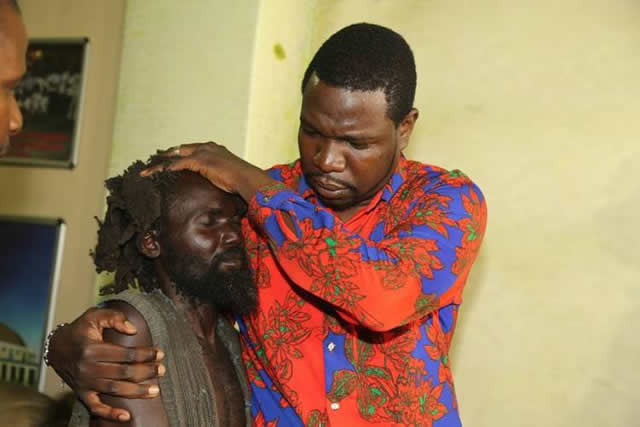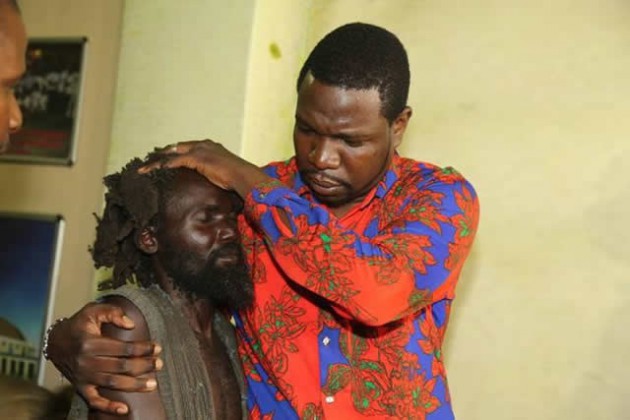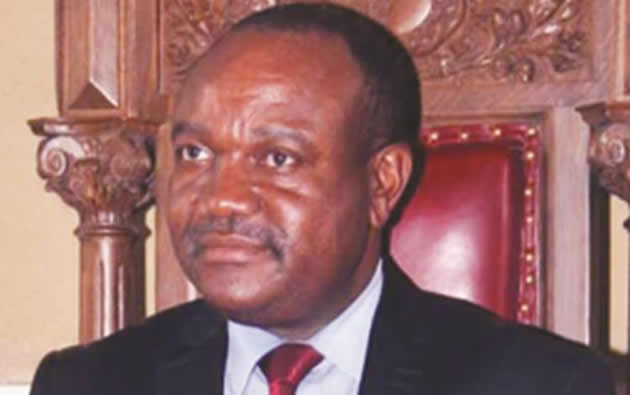Christian interventions for the marginalised

Stanely Mushava : Features Writer
Garikai Zindi’s post-deliverance media collage is a picture-perfect awakening from spiritual bondage. Zindi is reported to have been a mentally ill and violent vagabond when Prophetic Healing and Deliverance (PHD) Ministries founder Prophet Walter Magaya came to the rescue early last month.The transformation, as presented on PHD Ministries’ Facebook account, reads like an instantaneous crossover from rags to riches, mentally, spiritually and materially.
Zindi is shown in characteristic madman gear, scarcely covered by a ragged sweater and the scant remains of a short, his hair randomly locked and thickly layered with dirt for neglect.
In the ensuing restoration drama, Prophet Magaya lays hands on the man in prayer and his sanity is restored.
Zindi is then served food before a barber and a stylist take turns on him, recasting him from a messy vagrant to a fashion assassin.
As of today, Zindi is a proud homeowner, courtesy of PHD Ministries and has since reconnected with his family.
When the story was still all the rage on the media circuit, Magaya took to Bulawayo on a similar mission and reportedly prayed for another mental patient back to sanity, this time a better clad apparently no wiser Tawanda.
Before the new craze came to town, there was a guild of white-garment Christians from Norton who used to round up mentally ill vagabonds from the streets of Harare into a kombi and pray for them at an open space adjacent to the Harare Magistrates Court (Rotten Row).
The guild has since relocated to Norton where it is understood to be continuing its restoration and deliverance work.
The authenticity of this work has been contested by cynics and given a nod by followers, but the fact remains that no solid case can be made for the spiritual aspects of the transformation.
What is evident and laudable are the social implications and Christian imperative of this kind of work.
University of Zimbabwe (UZ) church historian Dr Munetsi Ruziva told The Herald Review that the emancipation of the individual is central to the Pentecostal approach to positive social change.
Dr Ruziva said while Christian denominations have a long-standing commitment to improve society, there two different strategies within the mainline (predominantly Protestant) fold and the Pentecostal fold.
“Pentecostals fight for social change by emancipating one person at a time, where you see the emphasis on personal salvation, personal deliverance and empowerment,” Dr Ruziva said.
“They go out for those issues that are apparently too small for the state and everyone else and make a change. Their Protestant counterparts are into big, community-oriented projects like building missions, but Pentecostals usually contribute to a better society by ministering one to one to the needs of each individual,” he said.
Compassion-driven deliverance miracles by Christ and the apostles feature eminently in the Bible.
Christ taught that his followers would keep the work sustained, even to a greater volume, making compassion work for the marginalised the church’s mandate.
Scepticism in mainstream Christian circles about compassion miracles may be a sign of healthy intelligence, if it has a credible basis, but it also points to a deficiency in today’s church.
If today’s Christians are programmed to dismiss the work Jesus mandated them to do, they may well have forgotten their signing on terms.
If such work was being done on a sustained basis, there would be less scepticism, as this would be the established pattern.
The Parable of the Good Samaritan gives a disturbing picture of church-bound pastors and church leaders who are too busy and too dignified to be socially involved.
Christ’s foremost commitment in the scriptures is not to religious convention but to compassion and to conviction. He ministers to everyone but is affectionately drawn to the marginalised and the disadvantaged.
Dr Ruziva, however, maintains that compassion work is not a preserve of Pentecostal and Apostolic denominations, as mainline churches’ labour of love for the vulnerable cannot be gain said.
“Churches run more orphanages than Government and receive subsidies for their charity work from the latter. The two have always been development partners in Zimbabwe, beginning in colonial times,” Dr Ruziva said.
“Because Protestants are more organised and more established, they do their work at community level and also lobby for social justice to address issues of poverty and social injustice at a broader level,” he said.
“They have infrastructure and head in the social direction while the Pentecostals major in the spiritual dimension. For them, if the individual is emancipated, society is also emancipated,” he added.
“With mainline denominations you have the Zimbabwe Council of Churches (ZCBC) and the Zimbabwe Catholic Bishops Conference (ZCBC) speaking out on matters of justice for the poor and the vulnerable but such a task takes the kind of organisation which the new preachers currently lack,” he said.
The new preachers, however, are awake to the challenge and organisations like the Evangelical Fellowship of Zimbabwe (EFZ) and the Council of African Apostles (CAA) are taking a holistic approach to positive social change.
In all, Dr Ruziva argues that no sectarian commitment is to be preferred over the other as their works feed into and complement each other.
UZ Old Testament scholar Dr Obvious Vengeyi said the church has a prophetic mandate to fight for social justice and to protect the vulnerable.
“Every prophet must model their ministry after the prophetic tradition of Bible times. Despite being for the majority, they went further for the marginalised, for orphans and widows against their exploiters, for the labourers, for the unjustly condemned,” Dr Vengeyi said.
“For the Old Testament prophets, Yahweh is the God of the peasants. In their traditions and their theology, Yahweh is the God of emancipation who delivers the oppressed from the house of bondage,” he said.
Dr Vengeyi said Christ’s ministry was also consistent with the Old Testament tradition of divine intervention for the disadvantaged as evidenced by His pro-poor teachings and the miracle accounts.
“From the pre-canonical, through the last canonical prophets, the emphasis of the prophets is social justice and they identify with the weaker social groups. The prophetic institution is ideally for the defence of the ordinary people,” he said.
“The state has institutions but legal justice is not the same as social injustice. A person can be prejudiced while the aggressor is covered at law. Prophets in the Old Testament were always the voice for the prejudiced. They identified the weaker position and stood for it,” he said.
“The people of Old Testament times transition from communalistic, to tributary, and proto-capitalistic economic models, with a tendency towards the exploitation of the majority and through the phases, the people remain with a conviction of God as being on the side of the exploited.
“The prophets speak from this understanding. When they say Jehovah Sabaoth (the Lord of hosts) their understanding of ‘hosts’ is the exploited majority. Nothing is sacred in capitalism as everything is subservient to the quest for riches so the prophets remain with a commitment to speak for the people,” Dr Vengeyi said.
He cited Samuel, Nathan, Elijah and Elisha as examples of prophets who mission was informed by the welfare of their people and maintained the merit of the original template.
Dr Vengeyi is critical of the profit motive in the work of the church, saying it is a deviation from the biblically demonstrated prophetic mandate.
“We commend the church for being socially involved, for their work in health care and education, but why is it that profit seems to be the basis of otherwise great initiatives?” he said.
“Church-run universities are more expensive than state universities; Africa University and Solusi University, for example, are elite universities. What you have in the end are Christian services which are out of the reach of the majority, only accessible to the minority. This is a deviation,” he said.
Besides, the clergy and the churches, lay Christians are also involved in compassion work on a sustained basis.
Chipo Muteve, a member of the Apostolic Mission in Zimbabwe, is a shining example.
Muteve runs Shekinah Restoration Centre, a sanctuary for people suffering from severe mental illness and their children.
Herself a Jairos Jiri graduate, Muteve is involved in a series of interventions for the down and out on the streets of Chivhu, helping them access treatment and reunite with their families, a responsibility she calls challenging, emotionally draining but rewarding.
“This work came about as a response to the needs of children who live on the streets. The burden of my heart is to give maternal care to vulnerable children from different backgrounds in Zimbabwe,” Muteve told The Herald Review.
“At Shekinah we mainly provide for the needs of people who suffer from severe mental illness and their children. My encounter with Enia and her two children begging outside Spar moved me to action.
“I know from my own experience how risky street life is. My mother was mentally ill all her life and my early life was a tough experience on the streets,” she said.
All said, Christ maintains in His keynote teachings that love and compassion are the title deeds to heaven.
Feedback: [email protected].










Comments